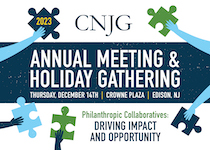Site Search
- resource provided by the Forum Network Knowledgebase.
Search Tip: Search with " " to find exact matches.
Philanthropic Collaboratives:
Driving Impact and Opportunity
 Thursday, December 14, 2023 - 9:00am to 3:00pm...
Thursday, December 14, 2023 - 9:00am to 3:00pm...
Thank you to all that attended CNJG’s 2023 Annual Meeting & Holiday Gathering - Philanthropic Collaboratives: Driving Impact and Opportunity on December 14.
...
Any and all staff and/or trustees from new CNJG members and any new staff and trustees of veteran CNJG members are invited to this Zoom meeting to meet fellow new members, hear about each other’s funding strategies, and learn about the programs and...
The Montclair Foundation (TMF) has awarded $65,000 in grant funding to 17 diverse nonprofits dedicated to making a positive difference in the Montclair community and its environs.
“We are proud to partner with these outstanding nonprofits...
The New Jersey State Council on the Arts held a public meeting on December 19, 2023, during which 30 New Jersey organizations received grants through the Council's Creative Aging Initiative grant program. This investment is the key component of the...
NJM Insurance Group is donating $100,000 to benefit hunger relief organizations throughout the mid-Atlantic region, including 12 in New Jersey, the company announced Wednesday.
CEO Mitch Livingston said NJM’s support of communities is...
The PSEG Foundation has awarded more than $1 million to 301 community organizations, 39 of which are first-time recipients, the group announced this week.
The grants range from $500 to $21,000 for eligible 501(c)(3) organizations, many of...
The Regional Foundation announced $2,000,000 in Neighborhood Planning and Implementation Grants to 11 organizations throughout Pennsylvania, Delaware, and New Jersey.
After several years, the foundation returned to investing in...
The Camden Coalition and the Bristol Myers Squibb Foundation (BMS Foundation) today announced the first-ever recipients of the New Jersey Safety Net Innovation Program (NJ SNIP), which will provide $3.3 million in grants to 11 organizations focused on...
The Healthcare Foundation of New Jersey (HFNJ) is pleased to announce that it has awarded $1,559,659 to thirteen New Jersey nonprofit organizations in its fourth quarter grant cycle of 2023. The total includes renewal funding for six projects that had...
Welcome to the new year! It was wonderful seeing so many members at the 2023 Annual Meeting & Holiday Luncheon on December 14. Both our luncheon plenary and workshop...
CNJG’s Finance and Investment Affinity Group exists to keep foundation executives informed as they manage the investment of their corpus. Growth of foundation assets and the active exchange of sound investment strategies is the focus of each program...
Advancing its ongoing commitment to ensuring a stable and healthy cultural industry, the New Jersey Cultural Trust Board approved a total of $798,395 in grants supporting capital projects at 21 nonprofit cultural organizations during an open public...
The FirstEnergy Foundation has granted surprise "Gifts of the Season" totaling $20,000 to two nonprofits that are working to make lives better in New Jersey communities served by FirstEnergy Corp. (NYSE: FE) subsidiary Jersey Central Power & Light...
The F. M. Kirby Foundation Board of Directors announced 255 grants totaling $15,431,175 were approved in 2023 to nonprofit organizations working to increase the strength and vitality of our communities.
Of this total, over 130 grants...
The New Jersey Council for the Humanities (NJCH) has announced $231,768 in grant funding to 19 organizations across the state.
The awards are split between 9 Incubation Grants and 10 Action Grants and represent 10 counties in New Jersey....
As Jewish institutions across the U.S., from synagogues to Jewish Community Centers, tighten security measures as a response to rising antisemitism, the Tepper Foundation noticed that fears were particularly heightened among young families. In...
Panasonic today announced the Panasonic Foundation, in partnership with the Community Foundation of New Jersey (CFNJ), has allocated four $25,000 Challenge Grants to nonprofit organizations dedicated to advancing STEAM education in Newark, NJ. The...
The Arts and Culture Renewal Fund (originally called the New Jersey Arts and Culture Recovery Fund) was created by a coalition of funders to raise and direct much needed support to the nonprofit arts and cultural sector statewide.
This panel...
By now you’ve heard the sad news. One of New Jersey’s most recognized, accomplished, and beloved leaders in the philanthropic sector passed away on Sunday, January 28.
Jeffrey Vega, President and CEO, Princeton Area Community Foundation,...
